The mystery and intrigue of Matt Drudge's Twitter feed
Let's talk about @Drudge

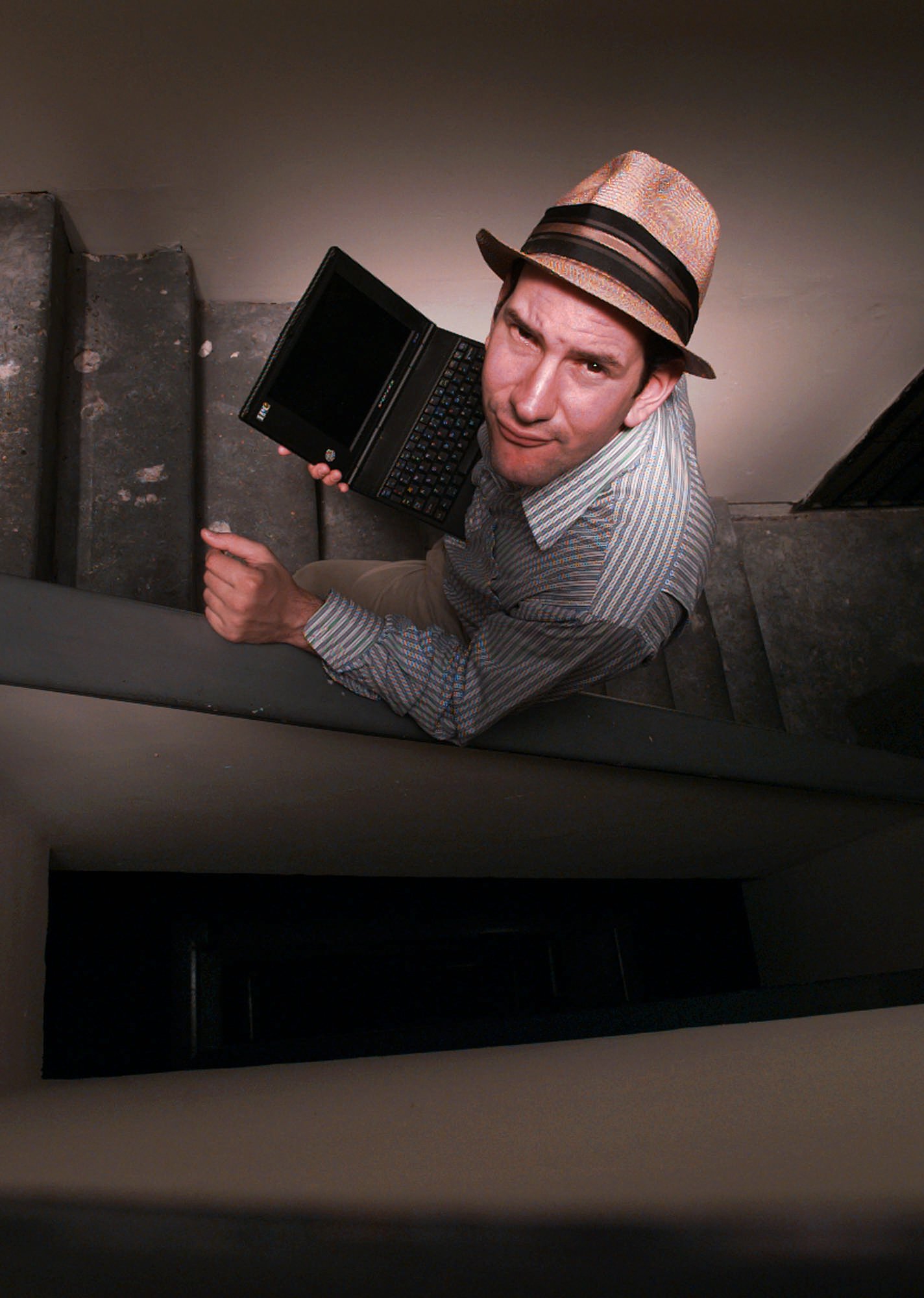
On Oct. 11, 2015, @DRUDGE went dark. Gone was the profile picture (dark sunglasses, fedora), expelled was the playful header image of two parrots preening. All that remained was a black square and a black header and the capital letters that bellowed his name: MATT DRUDGE.
Just days earlier, the reclusive and powerful founder of the Drudge Report had appeared on Alex Jones' InfoWars program, although "appeared" might be too generous. Despite Jones' pleading, Drudge refused to actually come on camera for the interview. Eventually, Jones' team convinced Drudge to speak into a microphone just out of the frame, even as Jones complained that no one would believe Drudge was actually there.
The resulting 45-minute interview is oddly similar to reading a Twitter thread — a faceless voice filibustering from offscreen — although Drudge insisted to Jones, "I don't do the socials." Then he corrected himself: "I've got that little Twitter thing, even that's kind of disgusting."
The Week
Escape your echo chamber. Get the facts behind the news, plus analysis from multiple perspectives.

Sign up for The Week's Free Newsletters
From our morning news briefing to a weekly Good News Newsletter, get the best of The Week delivered directly to your inbox.
From our morning news briefing to a weekly Good News Newsletter, get the best of The Week delivered directly to your inbox.
In fact, a little over a year before his appearance on InfoWars, in 2014, Drudge had wiped his Twitter account of its entire history, leaving up only a message that cryptically warned: "In this maniac Digital Age … it's vital … to clear your mind … constantly." A few months later, he would tweet "self-quarantine" — an apparent acknowledgment of his decision to purge the cache of his 140-character messages as if they were a disease.
To this day, Drudge's Twitter account is often left blank with only a default message telling his 522,000 followers that "@Drudge hasn't Tweeted." When he does tweet, the message stays up for just 24 hours before vanishing.
To many of Drudge's critics, the deleted tweets stand as an example of his paranoia and conspiratorial thinking. In truth, Drudge has been doing what Drudge does best — innovating the conversation.
"The reason I'm here, Alex, is you've made your own playground," Drudge told Jones from the shadows offscreen that day. "This is a figment of your imagination, and the Drudge Report is mine."
A free daily email with the biggest news stories of the day – and the best features from TheWeek.com
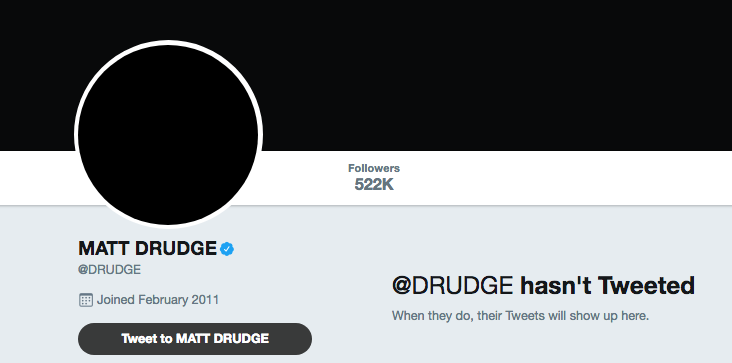
On Monday, Matt Drudge debuted a new look for the Drudge Report. It wasn't a big change — the Drudge Report is aesthetically distinctive in part because it still looks like it belongs in the 1990s, a case of something being so retro that it's cool again — but it was notable enough to spark queries into the logic behind it.
Drudge had turned his entire website black and white.
The decision gives the website a print journalism feel, but without the cost-saving rationale. Why render color photos black and white if it costs nothing to post them in color? Drudge's answer was startlingly sharp and prepared: "We have clearly entered a historic era," he told Axios. "It's feeling like the Roaring 20's this autumn with tech valuations at such hysterical heights. The socials, like Instagram Live, are alive with the spirit of Warhol. The sound of the atom splitting is looming over Korea. What's old is new. So, black and white and read all over!"
Axios, in response, marveled that "Drudge once again was the innovator — with a retro look, and a prescient rationale."
Although Drudge can certainly veer into the conspiratorial, the change to the Drudge Report's look this week is evidence of his intelligence and instinct, both of which have rarely led him astray. The Drudge Report launched as an email newsletter the early days of the internet and rose to prominence for breaking stories before the mainstream media reached them, with Drudge most famously pushing the Monica Lewinsky scandal in 1998. Reflecting on Drudge's outsized influence, former Politico editor Susan B. Glasser wrote of the moment as a turning point for political reporting: "The Drudge Report had proved beyond a doubt that the old gatekeepers of journalism would no longer serve as the final word when it came to what the world should know."
The words still ring true today: Drudge was the top referrer of traffic to The New York Times, The Wall Street Journal, and Fox News in 2015 and the third most visited media publisher in the United States in 2016, behind MSN and Disney Media Networks, which includes ESPN. He's even made it to being a Jeopardy question (and the contestant knew who he was right away).
While the official Twitter account for @DRUDGE_REPORT is active daily, replete with ellipses and capital letters that mimic the feel of the website, Drudge's personal tweets are rare and rarely about the news. Instead, they serve as a mysterious portal into the playground of Drudge's mind.
Famously reclusive, Drudge is hardly a hermit, and his physical isolation does not leave him out of touch with culture, as one might expect. His Twitter account shows, for example, that he is an active consumer of pop culture, although a bit of a curmudgeonly one, praising Lana Del Rey for being a surprise "stunner" while at the next moment mocking Beyoncé's famous scene in her visual-album Lemonade:



Drudge also posts quotes from people like the controversial columnist Walter Winchell and entertainment magnate David Geffen, leaving followers to wonder what provoked them. He also offers up his own aphorisms at times:
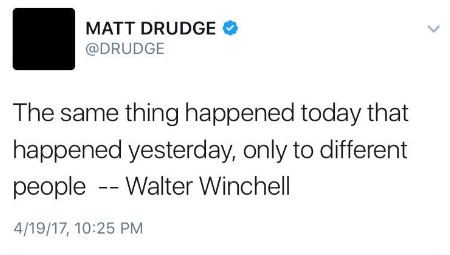

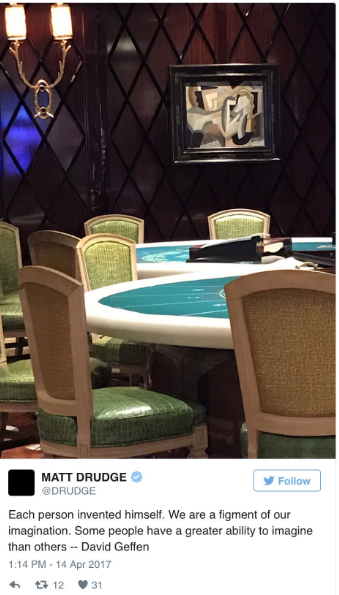
Yet another facet of Drudge's personal account is the political tweet, where he offers fickle praise and ample criticisms. In recent weeks, Drudge's irritation and disappointment have found a new, unexpected target: President Trump.
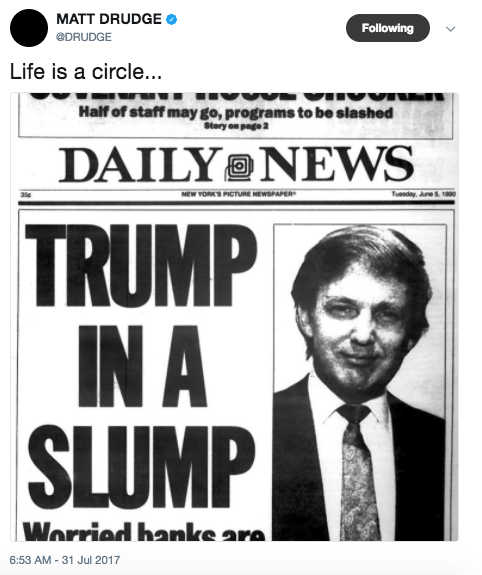


Drudge's tweets are often the opposite of how he presented himself in his InfoWars interview — instead of spilling out manifestos, conspiracies, and philosophies in lengthy threads, he uses his personal Twitter account to tease his ideas and let his followers attempt to fill in the blanks on their own. In many ways, it's similar to how he works as a kind of news cycle puppetmaster with the Drudge Report, operating the website as a curated and intentional conversation that is wiped daily for whatever tomorrow might bring.
To take Drudge's tweets too seriously, though, is an error. "Ultimately [Twitter is] boring and the kids are always off to something new," he said to Jones. Of course, Drudge did not reveal that he was also off to something new — essentially "breaking" Twitter to use it as a Snapchat-like blink-and-you-miss-it palimpsest for whatever comes to his mind.
Internet personas come and go. Everything today is ephemeral. And so, too, is the Twitter account of one of the most enduringly powerful men in media.
Jeva Lange was the executive editor at TheWeek.com. She formerly served as The Week's deputy editor and culture critic. She is also a contributor to Screen Slate, and her writing has appeared in The New York Daily News, The Awl, Vice, and Gothamist, among other publications. Jeva lives in New York City. Follow her on Twitter.
-
 Bari Weiss’ ‘60 Minutes’ scandal is about more than one report
Bari Weiss’ ‘60 Minutes’ scandal is about more than one reportIN THE SPOTLIGHT By blocking an approved segment on a controversial prison holding US deportees in El Salvador, the editor-in-chief of CBS News has become the main story
-
 Has Zohran Mamdani shown the Democrats how to win again?
Has Zohran Mamdani shown the Democrats how to win again?Today’s Big Question New York City mayoral election touted as victory for left-wing populists but moderate centrist wins elsewhere present more complex path for Democratic Party
-
 Millions turn out for anti-Trump ‘No Kings’ rallies
Millions turn out for anti-Trump ‘No Kings’ ralliesSpeed Read An estimated 7 million people participated, 2 million more than at the first ‘No Kings’ protest in June
-
 Ghislaine Maxwell: angling for a Trump pardon
Ghislaine Maxwell: angling for a Trump pardonTalking Point Convicted sex trafficker's testimony could shed new light on president's links to Jeffrey Epstein
-
 The last words and final moments of 40 presidents
The last words and final moments of 40 presidentsThe Explainer Some are eloquent quotes worthy of the holders of the highest office in the nation, and others... aren't
-
 The JFK files: the truth at last?
The JFK files: the truth at last?In The Spotlight More than 64,000 previously classified documents relating the 1963 assassination of John F. Kennedy have been released by the Trump administration
-
 'Seriously, not literally': how should the world take Donald Trump?
'Seriously, not literally': how should the world take Donald Trump?Today's big question White House rhetoric and reality look likely to become increasingly blurred
-
 Will Trump's 'madman' strategy pay off?
Will Trump's 'madman' strategy pay off?Today's Big Question Incoming US president likes to seem unpredictable but, this time round, world leaders could be wise to his playbook



